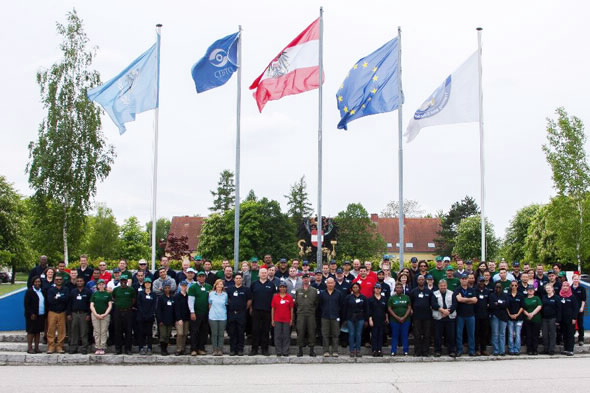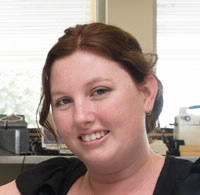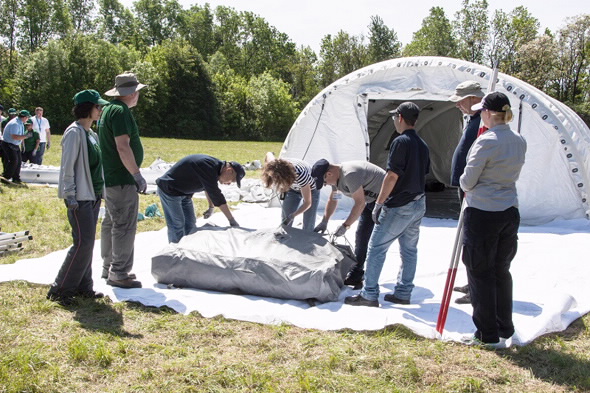 |
| CTBTO surrogate Inspectors who attended the logistics training in Vienna in June. Alison Flynn is is in the front row second from right. |
A young Australian researcher who works on the development of novel radiation detection systems at ANSTO is currently undertaking a three and a half year training program to become a surrogate inspector for the Comprehensive Nuclear Test Ban Treaty Organisation (CTBTO).
Physicist Alison Flynn (below right) of the Nuclear Stewardship group has just returned from in-field operations support training program in Vienna as part of the preparation to become an inspector to investigate suspected nuclear detonations.
 |
Once she has completed the extensive training and is added to a register of approved inspectors, she could potentially travel with a group of 40 to locations anywhere on the globe where there is a suspected nuclear blast.
The surrogate inspectors, who have a diverse range of expertise in nuclear science, geophysics, health physics, seismology and other fields, would have a limited period of time to take measurements, record observations and conduct experiments as potential evidence of a blast.
The collected data would be sent back to the Executive Council of the CTBTO, who would make the final judgment about the event.
An on-site inspection, which can only be authorised by the CTBTO at the request of a state that suspects another state of suspicious activity, is the final tool used to verify a nuclear blast.
The CTBTO uses a comprehensive verification regime includes an international monitoring system, which comprises a network of stations, including 21 in Australia, that monitor seismic activity, hydroacoustics (blast soundwaves through water), infrasound (blast soundwaves in the atmosphere) and detect radiation that is characteristic of a nuclear blast.
If distinct signatures in the monitoring data suggest a blast, then it would become the trigger for the CTBTO to initiate an inspection.
However, no actual inspections can take place until all 44 Annex 2 state parties have signed and ratified the CTBT treaty. So therefore although the CTBTO has previously announced its monitoring network had detected a nuclear explosion in North Korea, it could not send in inspectors.
In preparation for the time when the treaty comes into force, the CTBTO has been training a pool of surrogate inspectors. Flynn is one of 75 of the current intake from 49 countries being trained.
Once the Convention is in force, were an inspection request to be received by the Executive Council, the inspectors would have six days to get to the site where they would remain for an initial period of 25 days.
All scientific equipment and other resources need to set up a field camp would be transported to the location quickly.
 |
| In-field Operations Support Course held at Austrian Armed Forces International Training Centre & TSA Seibersdorf |
Because nuclear weapon testing would almost inevitably take place in a remote place, inspectors would have to be prepared to operate quite self-sufficiently, setting up a field base, install equipment and other resources and travel in a convoy. The focus of the training session in Vienna that Flynn attended in May was logistics.
Inspectors won’t be able to do whatever they want to when they arrive at the site; the scope of their activities is mandated in the CTBT. They must have a clear understanding of their rights and responsibilities under the treaty.
While in a foreign country, perhaps dealing with uncooperative hosts, skills in negotiation are important.
In the initial period, inspectors would use position finding, visual observation, still and video photography, gamma radiation monitoring, passive seismic monitoring and environmental sampling to prepare a progress report for the Executive Council.
“It’s important to be able to record what you see accurately, such as in a flyover, so other people can understand clearly what you saw,” said Flynn.
If the Executive Council wanted the inspection to continue, it could be extended another 60 days during which period a number of additional techniques are authorised. The inspection could also go on for a further 70 days.
“There is a rotation system in place, so it may not be the same 40 inspectors the entire time but people with different expertise joining at different times,” said Flynn.
The actual task of proving an underground nuclear detonation has occurred would be highly challenging.
“If the calculations are done well, you won’t get many nuclear signatures on the surface.”
“It is difficult to prove, but the technology is getting better,” said Flynn.
“We would look for things like geological events, cracks, craters but the ‘smoking gun’ is the presence of airborne radioactive xenon.”
“Radioxenon can escape from underground through cracks, but you have to be able to acquire a sample of it from the right place.,”
“Being able to narrow down the potential blast site is very difficult,” said Flynn.
Safety and security are crucial components of any prospective inspection. Surrogate inspectors are briefed by trainers who have previous experience as chemical or biological weapons inspectors.
“They share very sobering stories about what could happen,” said Flynn. “There is an element of danger but we are well prepared.”
Safety considerations include being able to take samples in a potentially contaminated environment and how to administer first aid in the field until a medical evacuation can be organised.
In October, the next training course will be held at the Nevada National Security Site in the US, and will focus on radionuclide detection and observation.
There is a significant amount of further training ahead including a field training exercise in 2020.
“ANSTO is the heart of Australia’s nuclear expertise that is applied for peaceful purposes. I am honoured that I can represent the organisation and Australia in a role that will protect people and the environment from nuclear explosions,” said Flynn.
Published: 06/06/2017


